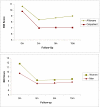Mechanisms of behavior change in alcoholics anonymous: does Alcoholics Anonymous lead to better alcohol use outcomes by reducing depression symptoms?
- PMID: 20102345
- PMCID: PMC2857524
- DOI: 10.1111/j.1360-0443.2009.02820.x
Mechanisms of behavior change in alcoholics anonymous: does Alcoholics Anonymous lead to better alcohol use outcomes by reducing depression symptoms?
Abstract
Rationale: Indices of negative affect, such as depression, have been implicated in stress-induced pathways to alcohol relapse. Empirically supported continuing care resources, such as Alcoholics Anonymous (AA), emphasize reducing negative affect to reduce relapse risk, but little research has been conducted to examine putative affective mechanisms of AA's effects.
Methods: Using lagged, controlled, hierarchical linear modeling and mediational analyses this study investigated whether AA participation mobilized changes in depression symptoms and whether such changes explained subsequent reductions in alcohol use. Alcohol-dependent adults (n = 1706), receiving treatment as part of a clinical trial, were assessed at intake, 3, 6, 9, 12 and 15 months.
Results: Findings revealed elevated levels of depression compared to the general population, which decreased during treatment and then remained stable over follow-up. Greater AA attendance was associated with better subsequent alcohol use outcomes and decreased depression. Greater depression was associated with heavier and more frequent drinking. Lagged mediation analyses revealed that the effects of AA on alcohol use was mediated partially by reductions in depression symptoms. However, this salutary effect on depression itself appeared to be explained by AA's proximal effect on reducing concurrent drinking.
Conclusions: AA attendance was associated both concurrently and predictively with improved alcohol outcomes. Although AA attendance was associated additionally with subsequent improvements in depression, it did not predict such improvements over and above concurrent alcohol use. AA appears to lead both to improvements in alcohol use and psychological and emotional wellbeing which, in turn, may reinforce further abstinence and recovery-related change.
Figures


Comment in
-
Commentary on Kelly et al. (2010): Alcoholics Anonymous, alcoholism recovery, global health and quality of life.Addiction. 2010 Apr;105(4):637-8. doi: 10.1111/j.1360-0443.2009.02883.x. Addiction. 2010. PMID: 20403015 No abstract available.
References
-
- Kessler RC, Crum RM, Warner LA, Nelson CB, Schulenberg J, Anthony JC. Lifetime co-occurrence of DSM-III-R alcohol abuse and dependence with other psychiatric disorders in the National Comorbidity Survey. Archives of General Psychiatry. 1997;54(4):313–321. - PubMed
-
- Regier DA, Narrow WE, Rae DS. The epidemiology of anxiety disorders: The Epidemiologic Catchment Area (ECA) Experience. Journal of Psychiatric Research. 1990;24(Suppl. 2):3–14. - PubMed
-
- Schuckit M, Tipp J, Bucholz K, Nurnberger J, Hesselbrock V, Crowe R, et al. The life-time rates of three major mood disorders and four major anxiety disorders in alcoholics and controls. Addiction. 1997;92(10):1289–1304. - PubMed
-
- Greenfield S, Weiss R, Muenz L, Vagge L, Kelly J, Bello L, et al. The effect of depression on return to drinking: A prospective study. Archives of General Psychiatry. 1998;55(3):259–265. - PubMed
-
- Marlatt GA, Gordon JR, editors. Relapse prevention: Maintenance strategies in the treatment of addictive behaviors. Guilford Press; New York: 1985.
Publication types
MeSH terms
Grants and funding
LinkOut - more resources
Full Text Sources
Medical

